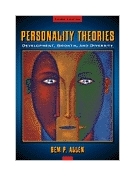Bem P.
Allen, Western Illinois University
Copyright:
2000 Format: Cloth, 518 pp ISBN: 0-205-28709-3
Summary
This
comprehensive, reader-friendly text has been revised and updated by the theorist behind
major movements in personality studies - Bem Allen. His presentation of theorists' lives
as well as their contributions to the field of personality, coupled with an outstanding
pedagogical program, separates this text from others on the market. The "Running
Comparison" sections employ a tabular format to stack the beliefs of all theorists
encountered thus far in the text against one another. In addition, each chapter begins
with a series of leading questions that provide context before the student begins reading.
"Summary Points" and "Essay/Critical Thinking Questions" wrap up each chapter,
serving as excellent discussion-starters. Diversity issues are also highlighted as part of
Allen's humanistic approach. All of these elements - including a conversational writing
style - help students appreciate the contributions of these major theorists in an
easy-to-follow format.
Appropriate
Courses
Designed
for a Personality Theories course at the undergraduate level.
Features
Provides
a comprehensive introduction to the key personality theorists by combining biographical
information on each theorist with their contributions to the field.
Contains
chapter opening questions, chapter ending summaries, and essay/critical thinking questions
to facilitate study of the material.
Includes
multiple links between chapters, created through the language of the text and through
"Running Comparison" tables in each chapter.
An
abundance of case studies and examples of real human functioning help deepen the student's
understanding of the concepts presented.
New To This Edition
Addition
of even more case studies shifts emphasis further toward a humanistic approach.
"E-mail
Interaction" feature (located at the end of each chapter) poses thought-provoking
questions to students, who in turn can engage in discussions directly with the author via
e-mail.
Expanded
coverage of Freud's famous cases and existentialism, the latter of which is explored in
four chapters and now includes Rollo May's ideas.
Incorporates
new information on such hot, contemporary topics as The Bell Curve, emotional
intelligence, and the eugenics scandal that cost Raymond Cattell a prestigious award.
Table Of Contents
Each
chapter concludes with one or more of the following: "Evaluation,"
"Conclusion(s)," "Summary Points," "Running Comparison," "Essay/Critical
Thinking Questions," and "E-mail Interaction."
1.
Introduction.
Preliminary Definition of Personality.
Methods of Studying Personality.
Personality Tests: Personologists' Tools.
Testing and Theorizing About Personality in a World of Human Diversity.
A Final Word About "Science."
2. The
Psychoanalytic Legacy: Sigmund Freud.
Freud, The Person.
Freud's View of the Person.
Basic Concepts: Freud.
3.
Personality's Ancestral Foundation: Carl Jung.
Jung, The Person.
Jung's View of the Person.
Basic Concepts: Jung.
4.
Overcoming Inferiority and Striving for Superiority: Alfred Adler.
Adler, The Person.
Adler's View of the Person.
Basic Concepts: Adler.
5.
Moving Toward, Away From, and Against Others: Karen Horney.
Horney, The Person.
Horney's View of the Person.
Basic Concepts: Horney.
6.
Personality from the Interpersonal Perspective: Harry Stack Sullivan.
Sullivan, The Person.
Sullivan's View of the Person.
Basic Concepts: Sullivan.
7. The
Seasons of Our Lives: Erik Erikson.
Erikson, The Person.
Erikson's View of the Person.
Basic Concepts: Erikson.
Theoretical and Empirical Support for Erikson's Point of View.
8. The
Sociopsychological Approach to Personality: Erich Fromm.
Fromm, The Person.
Fromm's View of the Person.
Basic Concepts: Fromm.
9.
Every Person Is to Be Prized: Carl Rogers.
Rogers, The Person.
Rogers' View of the Person.
Basic Concepts: Rogers.
10.
Becoming All That One Can Be: Abraham Maslow.
Maslow, The Person.
Maslow's View of the Person.
Basic Concepts: Maslow.
11.
Marching to a Different Drummer: George Kelly.
Kelly, The Person.
Kelly's View of the Person.
Basic Concepts: Kelly.
Personality Development.
12.
The Social-Cognitive Approach to Personality: Walter Mischel and Julian Rotter.
Mischel: A Challenge to Traits.
Mischel, The Person.
Mischel's View of the Person.
Basic Concepts: Mischel.
Rotter: Internal versus External Control of Our Behavior.
Rotter, The Person.
Rotter's View of the Person.
Basic Concepts: Rotter.
13.
Thinking Ahead and Learning Mastery of One's Circumstances: Albert Bandura.
Bandura, The Person.
Bandura's View of the Person.
Basic Concepts: Bandura.
14.
It's All a Matter of Consequences: B.F. Skinner.
Skinner, The Person.
Skinner's View of the Person.
Basic Concepts: Skinner.
15.
Human Needs and Environmental Press: Henry A. Murray.
Murray, The Person.
Murray's View of the Person.
Basic Concepts: Murray.
16.
The Trait Approach to Personality: Raymond Cattell and Hans Eysenck.
Cattell, The Person.
Cattell's View of the Person.
Basic Concepts: Cattell.
Eysenck: 16 = 3 - Conceiving of Personality in Three Dimensions.
Eysenck, The Person.
Eysenck's View of the Person.
Basic Concepts and Contributions: Eysenck.
Limitations.
17.
Personality Development and Prejudice: Gordon Allport.
Allport, The Person.
Allport's View of the Person.
Basic Concepts: Allport.
Personality Development.
Personality and Prejudice.
Księgarnia nie działa. Nie odpowiadamy na pytania i nie realizujemy zamówien. Do odwolania !.


